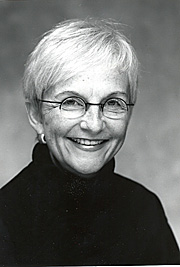By Manny Frishberg, JTNews Correspondent
At the start of the year, Bobbe Bridge quit her day job and began full-time work on a project she had started two years ago. The job she left was as justice on the state Supreme Court; the project, the Center for Children and Youth Justice, is a continuation of work she has been doing throughout her professional life.
“It was an evolutionary process starting several years ago as I was contemplating retirement,” Justice Bridge says. “Not wanting to retire-retire, more of a transition, I knew that I wanted to do something full-time with kids and families and court processes relating thereto. If you’ve read any of my bio, you know that I’ve been involved in [similar endeavors] virtually the whole time I was a judge. Even as a practicing attorney, a lot of my volunteer work was related to at-risk kids and the like. I knew that I wanted to continue [with] that, and, for the first time, [have this be] as 100 percent of my working life.”
The announcement that she would be stepping down a year before her term as justice was to end came last June, the same day that the center she’s helped establish had been chosen by the MacArthur Foundation to administer a five-year, $10 million program, the MacArthur Foundation Models For Change project, to promote juvenile justice reform efforts in Washington. Justice Bridge announced she was to become founding president of the center to lead the MacArthur Foundation’s work in Washington State.
“Every day I feel tugged to do more, and this major commitment by the MacArthur Foundation is a wonderful opportunity to make a difference in Washington,” she said when making the formal announcement last June. “After having given nearly two decades to the bench, it’s time to focus all my energies on helping children.”
Each of the four areas in the state the organization works with, Benton-Franklin, Pierce, Clark and King counties, is doing a little different project, Bridge says. Each county has three areas they are concentrating on: trying to reduce the proportion of African American, Latino and Native American youth pulled into the juvenile justice system; health care for kids when they are in the system; and working with truant youth.
“Every study shows [truancy] is one of the canaries in the mine to indicate there’s going to be trouble later on,” she says.
Justice Bridge began her tenure as a Supreme Court justice in 1999. She had been appointed to the King County Superior Court in 1990 and was the Presiding Judge there from February 1998 to January 1999. She was appointed as chief judge of the King County Juvenile Court, president of the Washington Superior Court Judges’ Association, and was also named Judge of the Year by both the Washington State Bar Association Family Law Section and the King County Bar Association. Before joining the bench, Justice Bridge was the first female partner at the law firm of Garvey Schubert Barer.
In 1982, she received the Edward F. Stern Human Relations Award from the American Jewish Committee and the Hannah G. Solomon award from the National Council of Jewish Women in 1996 for her efforts to make changes to improve the lives of children and families.
When she was elevated to the Supreme Court, she told this newspaper (then the Jewish Transcript) that both her Jewish heritage and her mother-in-law, Shirley Bridge — (Bobbe is married to Jonathan J. Bridge, co-CEO of Ben Bridge Jewelers) — inspired her to become a judge.
“One of the things that has inspired me, compelled me almost to be a judge, who was more in the community than many are, is certainly…my Jewish heritage, my feeling about being Jewish and tikkun olam (repairing the world),” Bridge said at the time. Bridge was the fourth woman and the third Jew to be a justice of the state Supreme Court.
Bridge says that part of the impetus to form the nonprofit CCYJ came from knowing that MacArthur was considering Washington as one of four states to fund, and that it needed an agency that could administer the grants for them. But her goal was to create a nonprofit that would help people “work better and work smarter to hopefully affect better outcomes for kids who are in our systems,” she says. She cited child welfare and juvenile justice as well as education and mental health as areas of interest.
CCYJ was also contacted by the Bill and Melinda Gates Foundation to study ways that the foundation could help support reforms in children’s services in Washington.
“For that we retained the services of several consultants,” Bridge says. “They [the Gates Foundation] are now contemplating what they want to do.”
She adds that contracting with foundations is not the center’s only work. CCYJ has also undertaken projects using its own funds to look at child welfare and the committees, task forces and “work groups” that have been formed by the three branches of state government to assess the performance of the Dept. of Children and Health Services. The organization has compiled a database to categorize their findings, and are now looking at ways to push reform.
The next step, Bridge says, is for the center’s board to look at the results to decide which, if any, particular proposals they want to try to get implemented.
“We have a number of other projects that, now that I have retired, will be coming into the center because they are projects that I have led, but [they] really have no homes outside my work [at this time],” says Bridge. “With my 30-odd-year experience in this field, [this] would be the best use of my talents in this next phase of my life. With the contacts that I have, I’m pretty good at getting people together, facilitating consensus, getting people to work together to implement change and the like.”
